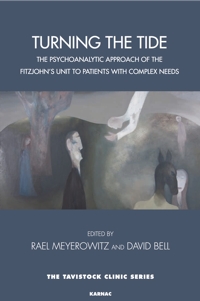Turning the Tide: The Psychoanalytic Approach of the Fitzjohn's Unit to Patients with Complex Needs

Book Details
- Publisher : Routledge
- Published : 2018
- Cover : Paperback
- Pages : 176
- Category :
Psychoanalysis - Category 2 :
Child and Adolescent Studies - Catalogue No : 37239
- ISBN 13 : 9781782203322
- ISBN 10 : 178220332X
Reviews and Endorsements
‘This book documents the remarkable achievement of David Bell and his team at the Tavistock Clinic. They have been able to continue, to extend, and to protect the tradition at the clinic of using psychoanalysis to treat severely ill patients in the NHS, which is now under threat. Through their excellent individual papers the team demonstrate how a psychoanalytic attitude can provide a humane and effective treatment environment which also provides a stimulating learning experience for the staff. It is a book that should be read by everyone working in the mental health field.’
- John Steiner, FRCPsych, author of Psychic Retreats, and recipient of the Sigourney Award
‘This book arises from and celebrates an innovative psychotherapeutic unit within the Tavistock Clinic that has undertaken to treat particularly difficult, distressed and disturbed patients. This group of patients is hard to classify and impossible to treat by conventional psychiatric methods based on a medical model of classification. As this book shows, it needs a psychoanalytically-informed, persevering approach that can be sustained for an adequate period of time. It also needs mutual support and shared experience amongst the staff engaged in the work. It is to the credit of this unit that they have sustained this in an overall therapeutic environment impatient of clinical difficulty and unfriendly to longer-term work. The book itself should inspire similar efforts and innovations that can demonstrate that sometimes the longer road is the shortest route and the most rewarding.’
- Ronald Britton, FRCPsych, Distinguished Fellow and Past President of the British Psychoanalytical Society, and recipient of the Sigourney Award
‘This modification of the model for psychological management of personality disorder is innovative, inspiring, and likely to be of enormous practical significance. It represents a highly coherent, effective response to the most complex and painful mental disorder there is.’
- Peter Fonagy, Professor and Head of Research Department Clinical, Educational and Health Psychology, UCL, and Chief Executive of the Anna Freud National Centre for Children and Families
While reading this enjoyable and useful book, my thought right from the beginning was that its title is entirely appropriate. It is about inverting a tendency we have today when trying to use our psychoanalytical instruments in difficult working conditions, such as in the case of the Fitzjohn’s unit. The tendency is to objectify, an objectification deriving from the institutions, from society and from the culture in which we live but, also, as David Bell convincingly illustrates in his Preface, sometimes from our patients themselves. It is this defensive self-objectification that treats 'the illness as if it really could be alienated from the rest of the personality.' Paradoxically therefore, the institution, volens nolens, as well as the policy of progressively reducing the funds destined to mental health and of relying only on short-term treatments, contributes to reinforcing this objectification rather than contesting it. I think that on many occasions psychoanalysts are guilty of seconding this tendency by refusing institutional work, while the authors of this book, by insisting on a multi-level approach to life and mental health in institutions, are heading in the right direction with courage and dedication.'
- Prof. Dr. Jorge Canestri, EPF President

